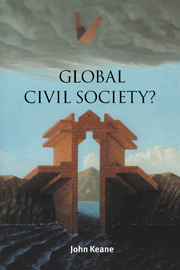Catalysts
Published online by Cambridge University Press: 14 January 2010
Summary
Traditions: the call of God
Both the idea and the concrete dynamics of global civil society can be better grasped by dwelling for a moment upon its historical origins. Intellectual proponents and activist champions of the idea of a global civil society have a bad habit of supposing that its institutions were born yesterday. By disregarding traditions – the gift of the dead to the living – the fans of global civil society fail to spot the deep roots of this globalising civil society. These run deep and have an entangled and branched – rhizomatous – quality about them. The social ties bound up with these traditions that feed present-day global civil society can be clarified by examining two separate but overlapping examples – taken from the worlds of Islam and Europe, respectively. They are arbitrarily chosen, but each illustrates two points that are of fundamental interest: that global civil society was formed by the horizon-stretching effects of previous social formations; and that these world-defining effects made possible the ‘action and reaction at a distance’ effects that are an intrinsic feature of global civil society.
Religious civilisations certainly developed world-views and world-girdling institutions that feed the streams of social life that are today global. Consider the new world religion of Islam, which was born in the early seventh century AD, in a region of the Arabian desert blanketed with crescent-shaped dunes and spotted with palm-fringed oases and teeming market towns populated by wandering tribes of Arab pagans and Jewish and Christian traders and travellers.
- Type
- Chapter
- Information
- Global Civil Society? , pp. 40 - 91Publisher: Cambridge University PressPrint publication year: 2003

